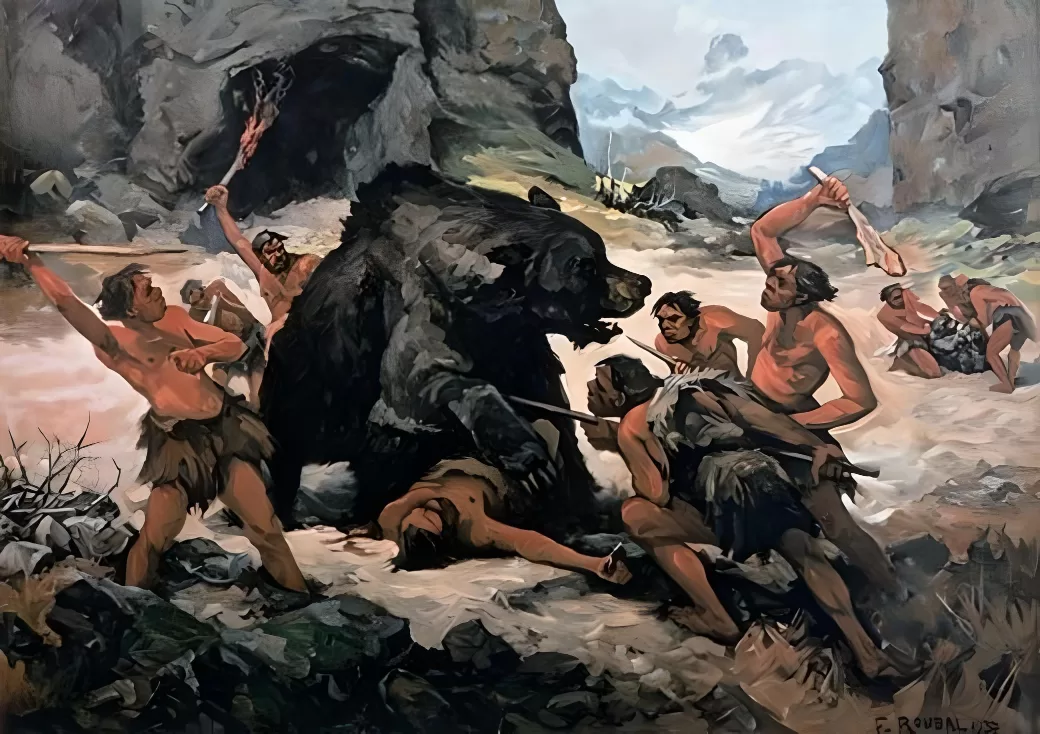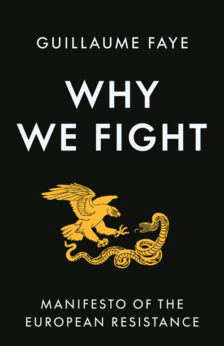Not to have courage, not to endure, not to persist, is not to live at all.
Hyman Segal, The Law Of Struggle
Somewhere in the dark recesses of terrestrial time, our earliest forebear sprang onto the world stage. His origins are still clad in the foggy cloaks of time as the sheer temporal distance to our time shrouds any true knowledge about him and keeps him locked outside of the periphery of accepted knowledge. Yet the mysterious multitude of visceral impulses modern man has inherited are like the voices of our most primordial ancestors echoing in our blood. Since the dawn of our race, man has thrown himself at the world. He could not have mustered enough food from inside the safety of a cave. He had to venture out into the world, a ravenous world, ready to devour him at any instance of unawareness. He was by necessity, like all things that tread the earth, a savage. There was no room for pity or fanciful idealism in his conception of nature. Love does not grow easily for something that is out to kill you. Man was irrevocably part of the lowest cycles of struggle.
Quickly man found himself to be inadequate in physical capacity. Long nights spent in bonfire-lit caves rendered him susceptible to visions of great tools. A Promethean inspiration drew from his innermost being visions of greatness, of bounty, and of dominance. Man, from the moment of the inspired inception of tools and weapons, was a hunter. By adopting tools and weapons, he raised the standard of struggling against nature, as he now, like the sabretooth, had weapons. He, a weak clawless creature, could now impose his will on the world and pursue a bounty much larger than he could before. In his feverish dreams, he murmured the names of his prey as he chased them in the fields of lucid dreams. His fortified confidence was brewing in the cauldron of his inner being, simmering with the ambition for a quest. He dreamt of the ultimate bounty, the king of quarries, the mammoth. A simple spear and the boundless impetus of his will presented to him such a different world from the one he departed, he could well have wandered in from another dimension. He, the weak animal of prey, now was a hunter and garnered the mindset of a king. Life was still “nasty, brutish, and short,” but he had a fighting chance. He was no longer a mere passenger on the train of existence, he had by virtue of his tools become a predator himself.
Primordial man’s usage of tools was the very spark that lit the fires of what would eventually result in the Industrial Revolution. The embrace of tools and weaponry put man on a trajectory of innovation and conquest that carries on through the present and into the future.
In modern times, the hunter/gatherer mindset is thought to have disappeared into the murky depths of the past and gone forever, and all that remains of what we know of him is scarcely sufficient to fill a small chapter in a history book. Modern man thinks himself beyond the savagery of the age of hunter-gatherers, as he whisks along in his hybrid car, works and lives in airconditioned spaces, and sleeps in secure houses devoid of face-gnawing predators. and owing to his birth into the modern world, the notion we were once part of the food chain has never occurred to him. He is too busy booking the spa to get his anus bleached and his balls waxed.
Modern man’s problems are minor inconveniences compared to the life of his primordial forebear who was regularly fighting off hungry predators. And yet, the hunter-gatherer drive still fuels his blood. The caveman condition still faintly underlines all we do, as can even be seen in the mall. Carefully conditioned consumption zombies solemnly shuffling through the mall and buying things do not immediately invoke ideas of a caveman fearlessly taking on the world; their behaviour is, however, nonetheless an emanation of the very caveman condition that is still in our blood. The lust and impulse to acquire bounty endures and stirs even the blood of the morbidly flaccid fanny pack-wielding mall dweller ever so subtly.
Even though the caveman condition is a mere whisper of what was once a roaring howl of self-determination, the primordial impulses will never disappear from our nature. Like dry kindling, the savage lurks in our deepest selves and is receptive to sparks. The modern world does not provide those sparks. With its rote repetition, stifling suburbanism, and lack of adventurous endeavours, it lacks the ignition power to deflagrate the caveman inside.
Ever since Goethe wrote Faust, we call those that have found ways to let the caveman out in constructive ways imbued by the Faustian spirit. The explorers of the world, the inquisitive and tenacious cartographers of human destiny, and history’s great conquerors have been fuelled by the same power that the caveman experienced when he first wielded a spear. Faustian man channels this energy through modern technology and in a world that is ruled by the law of struggle, he struggles according to a towering standard.
The virtue of courage, however, is so fundamental that it must not surprise us to find that all praise takes the form of recognition of courage, whether the subject of it is a soldier who has conquered or an etymologist who has persevered in his hunt for an old root.
Hyman Segal, The Law Of Struggle
Courage is a value so fundamental to Creation that it has been woven into the very fabric of reality. The law of struggle demands fighting in all circumstances against the tides of life. Courage is the value that is found and displayed when that which struggles is confronted by an increase in adversity. A buffalo that finds itself outflanked by hyenas can try to run, which would be entirely by the law of struggle. But we see often that the buffalo gets incensed and fuelled by intense rage and will to struggle, and he stands and fights the hyenas. Many a buffalo has fought and killed a whole pack of hyenas, artistically spilling hyena blood as a macabre watercolour, signed with the excavated entrails of his defeated foes. Courage impelled the buffalo to face death head-on. It is this visceral animalistic urge that chimes the bells of Faustianism, calling to mass all those with the heart and spirit strong enough to honour the call.
Religion is recognized as the highest attainment of human growth, and rightly so. It represents the carrying of struggle into domains that are beyond the limits of time, space, and the pressure of immediate relationships. It is therefore an extension of the battle-line beyond the out-posts of local conflicts.
Hyman Segal, The Law Of Struggle








Excellent; look forward to your future articles. Many folk are coming to the same reasoning.